Posted August 20, 2020 by Nicky in Reviews / 1 Comment
 The Last Smile in Sunder City, Luke Arnold
The Last Smile in Sunder City, Luke Arnold
From the cover onwards, The Last Smile in Sunder City is a patchwork of influences. Ben Aaronovitch, obviously and brazenly; my bets are on Jim Butcher as well. And, if not directly from Raymond Chandler, then his brand of noir and his style of imagery — there’s something about his comparisons that make it feel like a cut-rate Phillip Marlowe. It’s a very readable book, even though Arnold doesn’t have the control of language that Chandler did (none of his coinages are as good as “shop-worn Galahad”, even though Fetch Phillips suits the description as well as Marlowe does).
Sunder City is just one city in a world that used to be full of magic, but the source of magic has been destroyed by humans. Elves have aged suddenly and cruelly, anyone who uses magic is bereft, vampires are shrivelling to nothing… and Fetch Phillips is a man for hire amidst all this, tracking down missing folks and contemplating oblivion, at the bottom of a bottle or a long, long drop.
You know from the start that Fetch has done something godawful, and you can see it coming in the flashbacks, and you kind of want to stop it or ameliorate it somehow — and that’s when I knew it was really working for me. Fetch is not a good person, but you can see in him the ability to be so much better than he is… and even though he keeps making the stupidest mistakes, and you know nothing can be alright for him again, you can’t help but hope along with him that he can salvage something.
I’m kind of eager to read the next book right now; I don’t know how much this first one will stick with me, but it was a quick and enjoyable read, and I’m really curious to see where Arnold goes next with Fetch.
Rating: 4/5
Tags: book reviews, books, Luke Arnold, mystery, SF/F
Posted August 20, 2020 by Nicky in General / 4 Comments
Ever so slightly belated WWW Wednesday!
 What are you currently reading?
What are you currently reading?
The Last Smile in Sunder City, by Luke Arnold. The cover is so blatantly copying from Ben Aaronovitch’s fairly iconic covers that it raises my eyebrow every time, the narration is trying so hard to be Raymond Chandler without his absolute knowledge of where every word should go, and if Jim Butcher isn’t an influence as well I’ll eat my bookshelf. That said, it’s fun as well, and when it gives trying to coin a phrase a rest for five minutes, I’m settling into it well.
 What have you recently finished reading?
What have you recently finished reading?
The Woman in the Wardrobe, by Peter Shaffer, and before that, The Seventh Perfection. The latter is very cleverly narrated, and I really need to sit down and put my review into words before it slips away. I sense that the narration is going to drive a lot of people absolutely up the wall, but I thought everything was worked out pretty cleverly.
What will you be reading next?
There’s a good chance it’ll be one of the books I got for my birthday! The one I’m probably most excited about is Kindred: Neanderthal Life, Love, Death and Art, by Rebecca Wragg Sykes… but The Contact Paradox (Keith Cooper) is also calling to me.
What are you currently reading?
Tags: Ben Aaronovitch, books, Daniel Polansky, Jim Butcher, Luke Arnold, Peter Shaffer, Raymond Chandler, Rebecca Wragg Sykes, WWW Wednesday
Posted August 18, 2020 by Nicky in Reviews / 0 Comments
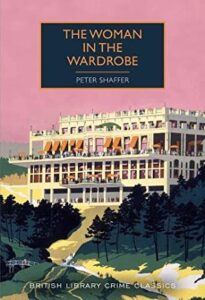 The Woman in the Wardrobe, Peter Shaffer
The Woman in the Wardrobe, Peter Shaffer
The Woman in the Wardrobe features a few elements I usually find myself disliking, to wit an amateur detective full of bombast, wit and ego, and a locked-room mystery. There are some definite similarities with Gideon Fell… but the writing style is so breezy — and the included caricatures of various characters so full of life — that it swept me right through my usual objections. It’s one of those with a clever trick ending (as most locked-room mysteries are) and it worked reasonably well.
I can’t say I like the amateur detective, but at least the narration knows he’s a bit of an ass. It doesn’t push too hard on his genius, though there is a very Sherlockian scene with a reverie over a pipe just as the case is reaching its conclusion… It’s all contrived, of course, but it’s fun. It mostly helps that it doesn’t take itself too seriously.
Rating: 3/5
Tags: book reviews, books, British Library Crime Classics, crime, mystery, Peter Shaffer
Posted August 18, 2020 by Nicky in Reviews / 3 Comments
 Botanical Folk Tales of Britain and Ireland, Lisa Schneidau
Botanical Folk Tales of Britain and Ireland, Lisa Schneidau
I was curious about this book because I used to collect pamphlets and stuff about local tourist attractions wherever I went, and ended up with a fair few that discussed folk traditions like fairy rings and vengeful trees. This kind of felt nostalgic for thumbing through those and trying to imagine the magic back into Britain… and it’s kind of cool to learn more about plants long-established in Britain and what people thought of them.
Not all the retellings really worked for me, nor the faux-dialect introduced to make them sound folksy. They might be better performed aloud, perhaps, but you’d have to have the right accent or you’d sound a little mocking, and that’s the way it comes off in print… though that’s probably a personal preference. The retellings are fairly straightforward, and there are few surprises in the tales, which are mostly traditional or based off traditional stories, and act in the expected way.
A fun curiosity, and perhaps one to dip in and out of if it’s something you’re interested in, but not a whole-hearted recommendation, I think. If you’re interested, you probably already know it’s your thing; if you’re just curious, the stories and their morals become a little repetitive.
Rating: 3/5
Tags: book reviews, books, Lisa Schneidau
Posted August 17, 2020 by Nicky in Reviews / 10 Comments
 The Long Way to a Small Angry Planet, Becky Chambers
The Long Way to a Small Angry Planet, Becky Chambers
I know there are people for whom this book leaves them entirely cold — whether the whole story falls apart for them, or the setting, or they see massive problems with certain plot points… I tried to read it more critically this time, ready to see those things and understand where they’re coming from. It didn’t work; I fell in love all over again and devoured it whole in about five seconds flat. Well, not quite, but you get the idea.
It’s the found family thing that gets me every single time, I think: the way they’ll cover for each other and work to understand each other and accept each other no matter what. This is mostly a book about good people, perhaps implausibly so: with almost everything any of them do, you can believe that they’re doing it because they think it’s right, and that it’s the right thing to do. (There is a major exception for me which I’ll discuss in a moment.) I can understand people who aren’t hooked by that, who don’t find it believable or can’t even get invested because the conflict feels implausible to them… but it’s catnip to me, apparently.
I do hate the whole plotline with Ohan, I’m afraid. Even as my heartstrings are tugged by the results of it, I loathe that Corbin takes away Ohan’s self-determination, and chooses things for them that they don’t want. I hate that the reader is manipulated into being glad about that, and to think that Corbin essentially does the right thing. Nope nope nope nope nope. It’s the dark spot in this book for me: I understand why it’s there, and I can’t help but love the bit with Dr Chef at the end… but the decision made for Ohan is not something I’m actually comfortable with.
It doesn’t darken the rest of the book for me, and as ever I actually cried cathartically for almost the last 50 pages of the book… but it’s worth knowing about, particularly if you have a disability or mental illness where other people think they know better than you about your own body. It’s very discomforting, and it’s worth knowing before you go in if that’s something you might be sensitive about.
I just love almost all the characters so much; Sissix is so darn awesome, Ashby’s a darling, Kizzy’s like Firefly’s Kaylee on speed (almost literally)… It all comes together so well for me. Pitched perfectly to my id, I guess!
Rating: 4/5
Tags: Becky Chambers, book reviews, books, queer fic, SF/F
Posted August 13, 2020 by Nicky in General / 3 Comments
Not joining the linkup this week… just too darn tired again. But I’d love to hear from anyone who drops by!
 What are you currently reading?
What are you currently reading?
I’m rereading The Long Way to a Small Angry Planet for a Habitica group read. I enjoy it a lot, the sense of family and love and compromise, and it’s proving a good read when (because we can’t catch a break) one of our bunnies is a bit off. Also, it’s hot, and I generally don’t want to do anything when I’m too warm, so having something familiar I can sink into is very appealing.
 What have you recently finished reading?
What have you recently finished reading?
Burnout, by Emily and Amelia Nagoski. It’s a self-help book and typical of the breed in many ways, including an overly chummy and simplified writing style that doesn’t tend to work for my brain. It did give me some ideas for stuff to do better for myself, even if it is deeply focused on assigned-female-at-birth people who identify as female and are treated as such. If you’re not fond of — or at least able to put up with — being addressed in “you go girl” terms constantly, it’s not going to be for you.
What will you be reading next?
Totally, totally unknown. I’ll probably try to return to and finish The Grace of Kings by Ken Liu, though.
What are you reading?
Tags: Becky Chambers, books, Emily and Amelia Nagoski, Ken Liu, WWW Wednesday
Posted August 11, 2020 by Nicky in General / 31 Comments

This week’s theme from That Artsy Reader Girl is books you love and haven’t reviewed, but I’ve been reviewing every book I’ve read for fifteen years now. So I’m going off-piste with a retrospective on my “book club”. I run it on Habitica, with a book each month, and I pick all the books based on my whim in that moment. I don’t guarantee the books’ quality or literary value or anything like that; it’s literally just a book I want to read, probably one I already own. It’s been a nice way to get some accountability for reading books from my shelves, and read alongside other people… without having to put up with anyone else’s taste in books. 😂
So here’s a shortlist of ones I’ve enjoyed discussing with the group…





- The Priory of the Orange Tree, by Samantha Shannon. I’ve actually not finished this one yet, since I’m also reading it with my Beeminder coworkers at a nice conservative rate everyone can stick to. We’re near the end now! I’ve really enjoyed it, and even enjoyed reading it in this really slow drip-wise fashion, because it was something I could always manage, no matter how crappy I was feeling about reading (or how daunted by the size of the book).
- Seeds of Science, by Mark Lynas. This is by someone who was previously really anti-GM, and came to change his mind. He picks away at some of the myths and lies around genetically modified food, and makes an excellent case for a rethink.
- Pale Rider, by Laura Spinney. I’ve read two books on the 1918 flu pandemic, and I honestly couldn’t choose one over the other; both looked at it from slightly different angles, though I think perhaps Spinney dug a bit further on the social and cultural effects.
- The House of Shattered Wings, by Aliette de Bodard. I kept thinking this wouldn’t be my thing, and then picked it for the book club to encourage me to give it a try. Lo and behold, I inhaled it! Such a fascinating mixture of mythologies, and a fantastic setting.
- Murder by Matchlight, by E.C.R. Lorac. I’m not sure if this was the first book I read by E.C.R. Lorac… it might have been. Either way, it was the one that switched her work from the “it’s a British Library Crime Classic, so I’ll probably get it and try it” to “I’ll pick up anything I find by her”. Her mysteries are often deeply rooted in a place, so that you can almost smell the farms or the fires of the Blitz.
- The Bell at Sealey Head, by Patricia McKillip. Pretty much anything by McKillip is going to be interesting, though I sometimes find the conclusions to her stories a bit difficult to follow. The Bell at Sealey Head was one I tore through, though.
- Provenance, by Ann Leckie. I’d have read this one anyway, and the Habitica challenge might actually have been for a reread for me. I love Provenance a lot; it’s not doing the same things as the Imperial Radch books, and it doesn’t feel the same in terms of narration or characters or plot. I think that led some people to be disappointed in it, but I wasn’t.
- Hild, by Nicola Griffith. Confession: I still haven’t actually finished this. But some of the descriptions are just perfect and beautiful, and I still mean to come back and finish it.
- The Hate U Give, by Angie Thomas. I probably wouldn’t have read this one without a book club, because YA with a contemporary setting isn’t normally my thing. I’m really glad I did, though; this book deserves all the hype.
- Girl Waits With Gun, by Amy Stewart. I should really read the second book in this series, because I read the first book sooo fast. As I recall, it wasn’t a universal win in the book club… but I really enjoyed the story, and appreciated learning about the real Constance Kopp as well.





One thing I want to do going forward is diversify the picks a bit — there have been authors of various marginalisations in the lineup, but I can do better. Luckily I’ve been picking up plenty of books that will qualify for that, in the past year!
Tags: Aliette de Bodard, Amy Stewart, Angie Thomas, Ann Leckie, books, E.C.R. Lorac, Laura Spinney, Mark Lynas, Nicola Griffith, Patricia McKillip, Samantha Shannon, Top Ten Tuesday
Posted August 10, 2020 by Nicky in Reviews / 4 Comments
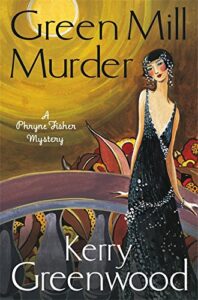 The Green Mill Murder, Kerry Greenwood
The Green Mill Murder, Kerry Greenwood
The Green Mill Murder is one of the books of this series which really sticks in my head, mostly because of the descriptions of the flight over the mountains, and then the silence and space of the mountains. That part is so vividly imagined — including Phryne’s dislike of it — that it can’t help but stick in my head… that and the sheer awfulness of both Charles and Mrs Freeman. The mystery itself feels a little unfair… I knew how it was done and still couldn’t piece it together until Phryne, like magic, pulled it out of the hat. I don’t always mind that, myself, but it does rankle with some mystery readers, so it’s worth knowing.
Ostensibly the main mystery of the book is the murder which happens in its opening page, when one of the dancers in a marathon dancing session suddenly collapses, and seems to have been killed with a very slim knife. Something’s changed about the corpse when Phryne next looks at it, but she can’t put her finger on what… and in the meantime her date has vanished off to be copiously sick. Or just vanished: the policeman who goes to look for him finds no trace.
I find the main mystery oddly forgettable, though, despite the power of Nerine’s voice and Tintagel’s alleged charms. I didn’t really see it myself, for Tintagel’s case, though of course Phryne is susceptible to a pretty face… it’s just that he’s also a bit of an amoral bastard, and that always colours my reading of his character. In any case, the bit that sticks in my head is Vic Freeman and his lonely hut. Or not lonely, really, given he has a horse (actually a donkey or mule, I think? I am too lazy to get up and check), a dog, and a wombat (who proves instrumental). The rest of it is full of awful people, but Vic is just happy to be alone, to have some silence and healing away from the city.
It’s an enjoyable read, but sometimes feels a little lopsided to me, because of the bits of the plot I prefer.
Rating: 4/5
Tags: book reviews, books, crime, Kerry Greenwood, mystery
Posted August 8, 2020 by Nicky in General / 20 Comments
Greetings, folks! This has been a good week for ARCs, and passable for reading… and I have my replacement ereader now, so I can get back to some neglected library books. Hurrah! It’s also been pretty busy in terms of posting reviews, which I hadn’t realised until starting this post. Whoa!
Linking up with The Sunday Post @ The Caffeinated Reviewer and Stacking the Shelves @ Reading Reality & Tynga’s Reviews.
Books acquired:

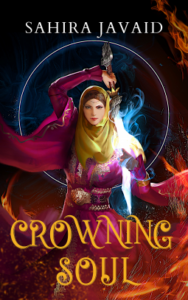
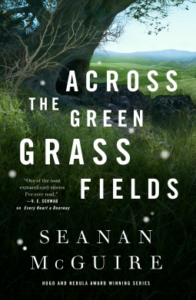



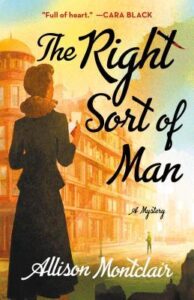
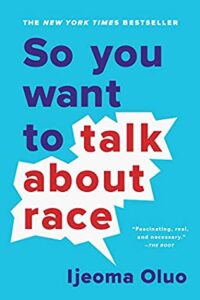
Thank you to the publishers who let me have ARCs (mostly Tor!) and also the two lovelies who have bought me books this week. You know how to spoil a Nicky, and it’s appreciated deeply.
Books read this week:



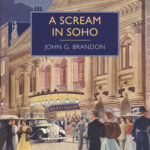

Reviews posted this week:
- Mystery at Olympia, by John Rhode. Not the most memorable story, actually; I’d thought better of John Rhode’s work in other outings (as Miles Burton). But fun enough. 3/5 stars
- Lock In, by John Scalzi. Very entertaining, and not a bad SF mystery either. Held up very well as a reread. 4/5 stars
- Drowned Country, by Emily Tesh. A lovely novella, following up on Silver in the Wood. I was mad at it at first for certain plot/character things… but it brought me round. 4/5 stars
- Head On, by John Scalzi. Also very entertaining, and that’s including the cat in witness protection which I’d forgotten to mention. 4/5 stars
- The Perilous Life of Jade Yeo, by Zen Cho. I don’t always get along with things that are meant to be funny, but this works very well for me, and the voice reminded me of I Capture the Castle, a solid favourite. 4/5 stars
- A Scream in Soho, by John G. Brandon. Rather sordid and racist. Meh. 1/5 stars
Other posts:
Whoa, that took some rounding up.
So how’re you folks? Been reading anything good, or stacking your shelves with anything shiny? I got my finished copy of Seven Devils as well, this week, so that’s something to look forward to!
Tags: books, Stacking the Shelves, weekly roundup
Posted August 8, 2020 by Nicky in Reviews / 0 Comments
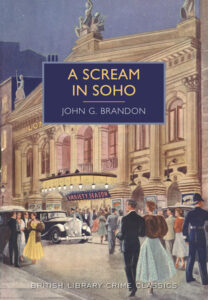 A Scream in Soho, John G. Brandon
A Scream in Soho, John G. Brandon
Ooookay this one is just somehow really not my thing. It’s all Italian mobsters and German spies, slathered on thick with a side of racial determinism. The policeman at the centre of the story, McCarthy, is prone to violence to get his way — and has a rather Holmes-ian moves-in-mysterious-ways air about him, along with various sidekicks pulled off the streets and a disguise or two. It’s fairly obvious whodunnit, from pretty early on, and whydunnit comes pretty quickly after as well. After that, McCarthy just knocks some heads together and does some casual breaking and entering.
The joy of Golden Age crime fiction is often the sense of order, the sense that things in Britain are fundamentally good and just. It’s a total nostalgic lie, and always was, and the noble policeman as much as any of it… and this doesn’t have to be everybody’s thing, but I do think it’s a big part of what calls to me about E.C.R. Lorac’s series detective, or John Bude’s: they are decent men, doing a job which they believe to be serving justice, and doing it for the right reasons.
Needless to say, then, I did not enjoy McCarthy, even though he’s probably more realistic in many ways — particularly not since we’re supposed to be entirely on his side. Nope, nope, nope.
Not one for me. 1/5 stars feels kind of unfair, but… no, I can’t honestly point to anything I liked.
Rating: 1/5
Tags: book reviews, books, British Library Crime Classics, crime, John G. Brandon, mystery
 The Last Smile in Sunder City, Luke Arnold
The Last Smile in Sunder City, Luke Arnold
































